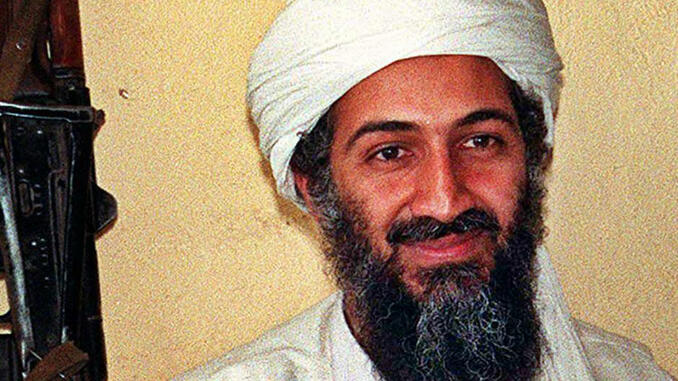
On November 1, 2017 the CIA released 470,000 documents that had been collected during the Navy SEALS raid on Osama bin Laden’s Pakistan compound in Abbottabad in 2011. Of those documents was bin Laden’s 228 page handwritten personal journal in which his last entry was the day before the raid. The journal, a yellow notebook, appears to be purchased at a well-known bookstore a few hours drive from the Abbottabad compound.
While it has always been suspected bin Laden had visited the West at various points in his life, there never was any direct confirmation until his journal was found. Among the first revelations the international press picked up on after the release of the journal, were entries where bin Laden describes trips to Great Britain. The first trip occurred when he was 13 years old for an unspecified “treatment.” The following year he returned to the country and spent ten weeks studying. During that time his journal reveals he visited the home of William Shakespeare in Stratford-upon-Avon where he describes himself as not being “impressed.” “I got the impression,” he wrote, “that they were a loose people, and my age didn’t allow me to form a complete picture of life there. We went every Sunday to visit Shakespeare’s house. I was not impressed and I saw that they were a society different from ours and that they were a morally loose society.”
One of the mysteries of Osama bin Laden’s life was when exactly had he become radicalized. It now appears that it was at a fairly young age. The journal reveals the first time Osama bin Laden remembers thinking about jihad and being influenced of jihad’s general atmosphere was while he was in high school. By 1976 he traveled alone to Turkey in the name of jihad for Deputy Prime Minister and future Prime Minister of Turkey, Necmettin Erbakan.
At some point the journal takes on a question and answer format which is thought to be with his son Khalid, who was also killed in the Navy SEAL raid. In answering a question about his religious influences, bin Laden cites, to some degree, the Muslim Brotherhood and the Prophet’s Biography, Sīra. He mentions some influence by the militant Islamist and head of the Muslim Brotherhood in Yemen, Abdul Majeed al-Zindani.
Bin Laden discusses his thoughts on various recent political events like the aftermath of the Arab Spring and the rise of the Umma Islamic Party in the Saudi Arabia which encourages him. He notes, “…there are perhaps faces/figures that have credibility [in the Umma Islamic Party] but in [Saudi Arabia] they are not allowed to speak. They need large numbers, because large numbers boost confidence and compensate for the lack of known and trusted faces.” He feels that the fall of regimes, like in Suadi Arabia and Bahrain are important. The fall of Bahrain he says is “easy” and means that “Islamists will rule.”
In May of 2011, just before bin Laden was killed, he had low expectations for any kind of uprising to take place in Syria, though he said it would eventually happen. “The flood is coming,” he wrote.
The CIA’s release of more documents further sheds light on Osama bin Laden’s beliefs and thought processes. The documents along with bin Laden’s journal can be found at https://www.cia.gov/library/abbottabad-compound/index.html
